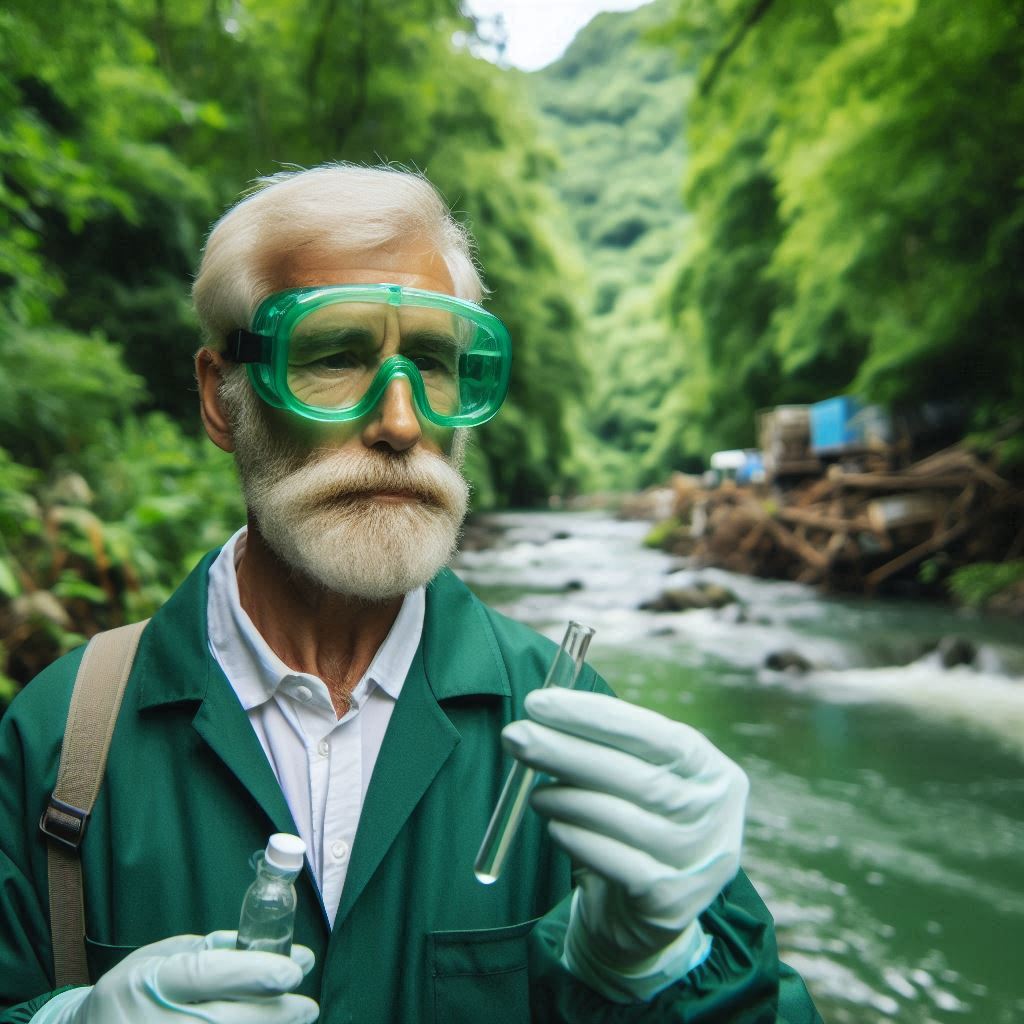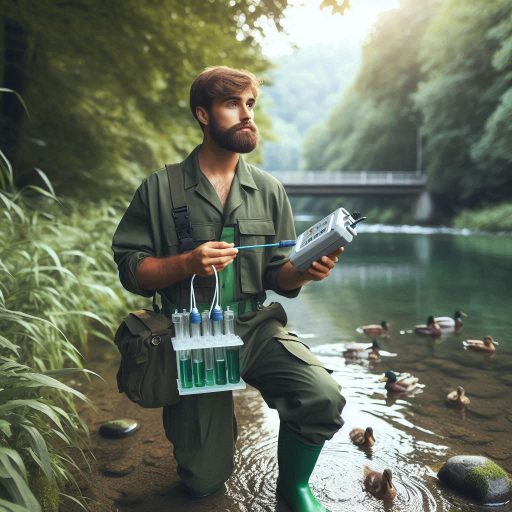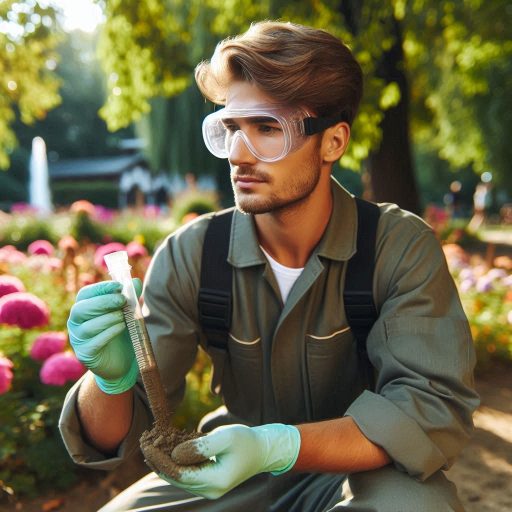Introduction
Environmental technicians play a crucial role in water quality testing as Environmental Technician Water Quality Testing.
They collect water samples from various sources, including rivers, lakes, and wells.
These technicians analyze the samples for contaminants and pollutants.
They use specialized equipment to measure parameters like pH, turbidity, and chemical levels.
Maintaining clean and safe water is essential for public health.
Contaminated water can lead to serious health issues, including gastrointestinal diseases and long-term illnesses.
Environmental technicians help prevent these risks by identifying pollutants early.
Their work ensures that drinking water meets safety standards and is free from harmful substances.
The health of aquatic ecosystems depends on water quality.
Polluted water can damage habitats, affect wildlife, and disrupt ecosystems.
By monitoring water quality, environmental technicians help protect these natural habitats.
Their efforts contribute to sustaining biodiversity and maintaining ecological balance.
Environmental technicians ensure that water remains safe and clean through rigorous testing and monitoring.
Their work is vital for both public health and environmental protection.
By identifying and addressing water quality issues, they play a key role in safeguarding our water resources.
Education and Training Requirements
Educational Background Needed for Environmental Technicians
To become an environmental technician specializing in water quality testing, a solid educational foundation is essential.
Start by earning a high school diploma or GED.
Focus on subjects like biology, chemistry, and environmental science.
Pursue a relevant degree such as an Associate‘s or Bachelor‘s in Environmental Science or a related field.
Coursework in chemistry, biology, and environmental regulations provides a strong base.
Some positions may require or prefer a Bachelor‘s degree for advanced roles.
Consider Specialized Training Programs
Many technicians benefit from specialized training programs in environmental technology.
These programs often include hands-on experience with testing equipment and procedures.
Enroll in accredited programs to gain practical skills and knowledge.
Look for programs that offer certifications or credentials in water quality testing.
This specialized training can enhance job prospects and career advancement.
Obtain Relevant Certifications
Certifications in environmental technology and water quality testing can be highly advantageous.
The Water Quality Association (WQA) offers certification programs for water treatment professionals.
American Water Works Association (AWWA) provides certifications specific to water quality testing.
Earning these certifications demonstrates expertise and commitment to the field.
Understand the Importance of Training in Water Quality Testing
Training in water quality testing is crucial for several reasons.
Accurate testing ensures that water meets safety and quality standards.
Environmental technicians must be proficient in using various testing equipment and methods.
Knowledge of sampling techniques and analysis procedures is essential for reliable results.
Master Key Testing Methods and Procedures
Technicians must master methods such as chemical analysis, microbiological testing, and physical testing.
Training provides skills in using tools like spectrophotometers and chromatographs.
Understanding how to interpret results accurately is critical for assessing water quality.
Learn about regulatory standards and how to ensure compliance with laws.
Stay Updated with Technological Advances
Water quality testing technology evolves rapidly.
Continuous training helps technicians stay current with new methods and equipment.
Keeping up with advancements ensures accurate testing and efficient data analysis.
Attend workshops, webinars, and conferences to learn about the latest technologies and practices.
Gain Hands-On Experience
Practical experience is invaluable for mastering water quality testing.
Participate in internships or lab work to gain real-world experience.
Hands-on training helps technicians apply theoretical knowledge in practical settings.
It also provides familiarity with industry-standard equipment and procedures.
By focusing on these educational and training aspects, aspiring environmental technicians can build a strong foundation for a career in water quality testing.
Proper education, specialized training, and continuous learning are key to success in this vital field.
Read: CAD Technician Salary: What to Expect in the USA
Duties and Responsibilities
Tasks of an Environmental Technician in Water Quality Testing
Environmental technicians play a crucial role in ensuring water quality.
They perform various tasks to monitor and improve water safety.
Understanding these tasks is essential for maintaining accurate and reliable water testing results.
Sample Collection
Technicians start by collecting water samples from different sources.
They use clean, sterilized containers to avoid contamination.
Accurate sampling techniques ensure the water tested reflects its true quality.
Technicians follow strict protocols to preserve sample integrity during collection.
Sample Preparation
Once collected, technicians prepare samples for analysis.
This preparation involves filtering and preserving the water to prevent changes in its composition.
Technicians must use appropriate chemicals and methods to avoid altering the sample‘s properties.
Laboratory Analysis
In the laboratory, technicians analyze the water samples.
They perform tests to measure pollutants, bacteria, and chemical levels.
Technicians use sophisticated equipment to ensure precise measurements.
They follow established procedures for each test to guarantee accuracy and reliability.
Data Recording and Interpretation
Technicians record the results from the laboratory tests.
They meticulously log data into databases for analysis and reporting.
Accurate data recording is essential for tracking water quality trends over time.
Technicians interpret the results to determine the water’s safety and compliance with regulations.
Report Generation
Technicians compile their findings into detailed reports.
These reports include test results, analysis, and recommendations for any necessary actions.
Clear and accurate reporting is vital for communicating water quality issues to stakeholders and regulatory agencies.
Importance of Following Protocols and Guidelines
Following protocols and guidelines is crucial in water quality testing.
Proper sample collection and preparation prevent contamination and ensure reliable results.
Adhering to testing procedures helps maintain the accuracy of measurements and data integrity.
Strictly following guidelines ensures that the water quality assessments meet regulatory standards.
Deviations from protocols can lead to incorrect results, potentially affecting public health and safety.
Technicians must remain diligent in adhering to these procedures to uphold the credibility of their work.
Quality Control Measures
Environmental technicians implement quality control measures to ensure consistent results.
They regularly calibrate equipment and validate testing methods.
Quality control practices help identify any anomalies or errors in the testing process.
By rigorously following established protocols and guidelines, technicians safeguard the accuracy and reliability of water quality tests.
Their meticulous approach ensures that water remains safe for consumption and meets environmental standards.
Read: Top CAD Software for Aspiring CAD Technicians
Sampling and Testing Procedures
The Process of Collecting Water Samples
Collecting water samples is a crucial task for environmental technicians.
It involves several precise steps to ensure accurate analysis.
First, technicians select appropriate sampling sites based on the study objectives.
They may choose sources like rivers, lakes, or groundwater wells.
Each site must be chosen to represent the water source effectively.
Next, technicians prepare the sampling equipment.
They use clean, sterilized containers to avoid contamination.
Depending on the source, they may use grab samples or composite samples.
Grab samples are collected at a single point in time, while composite samples combine multiple grab samples over time.
Technicians then carefully collect the water samples.
For surface water, they dip the container below the water surface, avoiding contact with the container’s edges.
For groundwater, they use specialized pumps to extract water from wells.
They ensure that the sampling equipment does not alter the sample‘s composition.
After collecting the samples, technicians label them accurately.
They record details such as the date, time, and location of the sample.
Proper labeling and documentation are crucial for tracking and analyzing the samples effectively.
Finally, technicians store the samples under conditions that preserve their integrity until analysis.
Types of Tests Conducted to Analyze Water Quality
Environmental technicians conduct various tests to assess water quality.
These tests help identify contaminants and ensure the water meets safety standards.
Transform Your Career Today
Unlock a personalized career strategy that drives real results. Get tailored advice and a roadmap designed just for you.
Start NowCertainly! Here‘s a list of common types of tests conducted to analyze water quality:
- Chemical Oxygen Demand (COD)
- Biochemical Oxygen Demand (BOD)
- Total Suspended Solids (TSS)
- pH Level
- Turbidity
- Nitrate and Nitrite Levels
- Dissolved Oxygen (DO)
- Coliform Bacteria Testing
- Hardness Test
- Heavy Metals Analysis
- Chlorine Levels
- Phosphates Analysis
- Temperature Measurement
- Total Dissolved Solids (TDS)
- Pesticide Residue Testing
They help determine if the water contains substances that could harm aquatic life or humans.
Environmental technicians follow a detailed process for collecting water samples.
They then conduct various tests to analyze physical, chemical, biological, and toxic parameters.
These steps are essential for ensuring water quality and safety.
Read: Surveying and Mapping Technician Internships: A Guide

Equipment and Technology Used
Water quality testing is a critical task for environmental technicians.
Accurate testing ensures safe and clean water for communities.
Here are some essential tools and equipment for water quality testing.
Essential Tools and Equipment for Water Quality Testing
- pH Meters: Measure the acidity or alkalinity of water. Accurate pH readings are crucial for assessing water quality.
- Turbidity Meters: Assess the cloudiness of water caused by suspended particles. Turbidity levels indicate the presence of contaminants.
- Conductivity Meters: Measure the water‘s ability to conduct electrical current. This helps determine the concentration of dissolved salts.
- Dissolved Oxygen Meters: Gauge the amount of oxygen in the water. Oxygen levels are vital for aquatic life health.
- Chemical Test Kits: Detect specific contaminants like nitrates, phosphates, and chlorine. These kits provide quick and reliable results.
Advanced Analytical Equipment
- Spectrophotometers: Analyze light absorption to measure concentrations of various substances. They provide precise readings for numerous water parameters.
- Gas Chromatographs: Separate and identify compounds in water samples. They are essential for detecting organic pollutants.
- Mass Spectrometers: Determine the molecular weight and structure of substances. They enhance the ability to detect trace contaminants.
- Automated Samplers: Collect water samples at regular intervals. Automation improves consistency and reduces manual errors.
Technological Advancements in Water Quality Testing
Advancements in technology have significantly improved water quality testing.
Here‘s how these innovations enhance accuracy and efficiency:
- Increased Sensitivity: Modern instruments can detect lower concentrations of contaminants. This sensitivity ensures even trace amounts are identified.
- Real-Time Monitoring: Advanced sensors provide real-time data on water quality. Continuous monitoring allows for immediate action if issues arise.
- Data Integration: Technology enables the integration of data from multiple sources. This holistic view helps in better decision-making and analysis.
- Automation: Automated systems reduce the need for manual handling. This increases testing efficiency and minimizes human error.
- Portable Devices: Advances in portable technology allow for field testing. Technicians can now perform high-precision tests on-site, improving response times.
- Enhanced Data Storage: Modern systems offer improved data storage and retrieval. This facilitates long-term tracking and historical analysis of water quality trends.
Benefits of Technological Innovations
Technological advancements enhance the accuracy of water quality tests.
They reduce errors, increase precision, and provide more reliable results.
Efficiency improves as automated and real-time systems streamline testing procedures.
These innovations contribute to better water management and safer environmental practices.
The right tools and equipment are essential for effective water quality testing.
Technological advancements continue to refine these tools, improving accuracy and efficiency.
Environmental technicians benefit from these innovations, ensuring the highest standards in water quality management.
Read: Impact of Drones on Surveying and Mapping
Data Analysis and Reporting
Interpretation of Test Results
Interpreting water quality test results is a critical part of an environmental technician‘s role.
Accurate analysis of these results informs decisions about water safety and treatment.
Technicians analyze data to determine the presence of contaminants.
They compare test results against established safety standards.
Understanding statistical significance helps in identifying trends or anomalies.
Technicians use software tools to facilitate data analysis.
They must be adept at recognizing patterns and deviations.
Accurate analysis is essential for making informed recommendations.
Documenting Findings
Documenting findings with precision is crucial for maintaining data integrity.
Technicians record all observations, measurements, and test results meticulously.
This documentation provides a clear record of the water quality over time.
Detailed records support transparency and accountability in the testing process.
Proper documentation is essential for tracking long-term changes in water quality.
Presenting Reports
Presenting reports to stakeholders is a key responsibility.
Technicians compile their findings into comprehensive, clear reports.
These reports include data analysis, interpretations, and recommendations.
Effective communication of results helps stakeholders understand the significance of the data.
Technicians must present complex information in a straightforward manner.
Well-organized reports support decision-making processes.
Importance of Accuracy
Accuracy in documenting and reporting findings is vital.
Inaccurate data or reports can lead to incorrect conclusions.
This can impact public health and environmental safety.
Technicians must ensure that every detail is correct and every result is verified.
Reliable data supports effective water management strategies and compliance with regulations.
Significance for Stakeholders
Stakeholders rely on accurate reports to make decisions about water quality.
These may include regulatory agencies, local governments, and community organizations.
Technicians provide essential information that influences policy and regulatory measures.
Clear and accurate reports help stakeholders implement appropriate actions to address water quality issues.
Importance of Accurate Documentation and Reporting
Documenting findings accurately is crucial in water quality testing.
Environmental technicians record every detail of their tests, including sample locations, dates, and conditions.
Precise documentation ensures that data is reliable and reproducible.
It provides a clear record of water quality over time, which is essential for tracking changes and identifying trends.
Impact on Decision-Making
Accurate documentation supports informed decision-making.
When technicians provide clear and detailed records, stakeholders can make well-informed decisions about water safety and management.
This includes recommendations for treatment, policy changes, and regulatory actions.
Reliable documentation also helps in responding to emergencies or contamination events effectively.
Presenting Reports to Stakeholders
Presenting findings to stakeholders involves creating comprehensive reports.
Technicians must communicate complex data in an understandable format.
Clear, concise reports help stakeholders grasp the significance of test results and their implications.
Effective presentation ensures that decision-makers, such as government agencies and public health officials, can take appropriate actions.
Building Trust
Accurate documentation and thorough reporting build trust with stakeholders.
Transparency in reporting fosters confidence in the technician‘s work and the reliability of the data.
It demonstrates professionalism and commitment to maintaining high standards in water quality management.
Showcase Your Business Today
Reach thousands of readers actively exploring professional services. Publish your business profile and grow your audience now.
Publish NowEnvironmental Regulations and Compliance
Ensuring Compliance with Environmental Regulations
Environmental technicians play a crucial role in ensuring compliance with local, state, and federal regulations.
Their work directly impacts water quality and environmental protection.
Understanding their responsibilities helps maintain regulatory standards and uphold ethical practices.
Responsibilities in Compliance
Environmental technicians conduct water quality tests to ensure that results meet regulatory standards.
They collect samples from various sources and analyze them for contaminants.
By adhering to prescribed testing methods, they provide accurate data for regulatory compliance.
Technicians also maintain records of test results and procedures, ensuring transparency and accountability.
Adhering to Local, State, and Federal Regulations
Technicians must be familiar with local, state, and federal regulations regarding water quality.
They need to understand specific standards for contaminants and acceptable levels.
Compliance with these regulations helps prevent environmental harm and protects public health.
Technicians must stay updated on changes in laws and standards to ensure ongoing compliance.
Repercussions of Violating Environmental Laws
Violating environmental regulations can lead to serious consequences.
Non-compliance may result in hefty fines and legal action against individuals or organizations.
Repeated violations can damage reputations and lead to loss of licenses.
Beyond financial penalties, environmental damage caused by non-compliance can have long-lasting effects on ecosystems and communities.
Importance of Upholding Ethical Standards
Upholding ethical standards is essential in environmental testing.
Technicians must report accurate test results, even if they indicate non-compliance.
Falsifying data or neglecting proper procedures compromises the integrity of environmental protection efforts.
Ethical practices ensure that water quality remains safe and that public trust is maintained.
Reporting and Documentation
Accurate documentation and timely reporting are vital in maintaining compliance.
Technicians must keep detailed records of all testing activities and results.
Proper documentation supports transparency and accountability in environmental practices.
It also aids in addressing any issues that may arise during regulatory reviews or audits.
Continuous Training and Education
Ongoing training and education are crucial for environmental technicians.
Regular updates on regulatory changes and advancements in testing methods help maintain compliance.
Technicians should participate in workshops and training programs to stay informed.
Continuous learning ensures that they perform their duties effectively and uphold regulatory standards.
Building a Culture of Compliance
Creating a culture of compliance within an organization starts with technicians.
They set an example by adhering to regulations and ethical standards.
Promoting a strong commitment to environmental protection within teams helps prevent violations.
A culture of compliance fosters trust and enhances the overall effectiveness of environmental protection efforts.
Environmental technicians are key to ensuring adherence to environmental regulations.
Their role involves rigorous testing, accurate reporting, and ethical practices.
Understanding and upholding these responsibilities help prevent the repercussions of non-compliance and safeguard water quality.
Through continuous education and a commitment to ethical standards, technicians contribute to a healthier environment and a more sustainable future.
Explore Further: Systems Engineer vs. Network Engineer: Key Differences
Importance of Water Conservation
The Role of Environmental Technicians in Promoting Water Conservation Efforts
Environmental technicians play a crucial role in water conservation.
They ensure that water resources are managed effectively and sustainably.
This section highlights their responsibilities and the importance of their work in addressing water pollution and promoting sustainable practices.
Impact of Water Pollution on Ecosystems
Water pollution has severe consequences for ecosystems.
Contaminants such as chemicals and waste disrupt aquatic life.
Polluted water can harm fish, plants, and other wildlife, leading to ecosystem imbalances.
These disturbances can result in the loss of biodiversity and the degradation of natural habitats.
Moreover, polluted water affects the health of communities.
Contaminated sources can lead to diseases and health issues in humans.
This impact extends beyond the environment to affect societal well-being and economic stability.
The Role of Environmental Technicians in Water Quality Testing
Environmental technicians are on the front lines of water quality testing.
They collect samples from various water sources to test for pollutants and contaminants.
Their work helps identify potential sources of pollution and assess the health of water bodies.
Technicians analyze data to monitor changes in water quality over time.
This ongoing analysis is crucial for detecting trends and addressing emerging issues.
By maintaining accurate records, they provide essential information for managing water resources and implementing conservation strategies.
Promoting Sustainable Water Management Practices
Technicians advocate for sustainable water management practices.
They work to ensure that water use and disposal are conducted responsibly.
This includes recommending practices to reduce waste and prevent contamination.
Their recommendations help communities and industries adopt more sustainable approaches to water use.
Additionally, technicians engage in public education efforts.
They inform communities about the importance of water conservation and proper waste disposal.
By raising awareness, they empower individuals and organizations to take action in preserving water resources.
Importance of Sustainable Water Management
Sustainable water management is essential for protecting ecosystems and human health as environmental Technician Water Quality Testing.
Effective management helps prevent pollution and ensures that water resources are available for future generations.
It supports the resilience of ecosystems and the stability of communities.
Technicians’ work in promoting and implementing these practices is vital.
They bridge the gap between scientific knowledge and practical application.
Their efforts contribute significantly to the overall health of our water systems and the environment.
Environmental technicians are instrumental in water conservation efforts as environmental Technician Water Quality Testing.
They play a key role in monitoring water quality and advocating for sustainable practices.
Their work helps mitigate the impact of water pollution on ecosystems and supports the management of vital water resources, cance of their work in safeguarding water resources for future generations
Learn More: How to Network as a Network Engineer
Conclusion
Environmental technicians play a crucial role in water quality testing.
They collect water samples from various sources, such as rivers and lakes as environmental Technician Water Quality Testing
Technicians analyze these samples to detect contaminants and assess water quality.
They use specialized equipment and follow precise protocols to ensure accurate results.
The work of environmental technicians is vital for safeguarding water resources.
By identifying pollutants and assessing water quality, they help protect public health.
Their findings guide regulatory measures and conservation efforts as environmental Technician Water Quality Testing
Ensuring clean water today secures a healthier environment for future generations.
Environmental technicians‘ efforts contribute to sustainable water management.
Their work helps maintain safe water supplies for communities and ecosystems.
By ensuring water quality, they play a key role in preserving essential resources for the future.
They collect samples from rivers, lakes, and other water bodies for environmental Technician Water Quality Testing
Using specialized equipment, they analyze these samples for contaminants and pollutants.
Technicians follow strict protocols to ensure accurate and reliable results.
Their work involves both field collection and laboratory analysis, ensuring comprehensive assessments of water quality.
The role of environmental technicians is crucial in safeguarding our water resources.
By detecting pollutants, they help prevent contamination of drinking water supplies.
Their analysis informs regulatory decisions and public health guidelines.
Accurate water testing helps manage and mitigate environmental risks, protecting ecosystems and human health as Environmental Technician Water Quality Testing.
Environmental technicians play a vital role in preserving water quality for future generations.
[E-Books for Sale]
The Big Book of 500 High-Paying Jobs in America: Unlock Your Earning Potential
$19.99 • 500 High-Paying Jobs • 330 pages
Explore 500 high-paying jobs in America and learn how to boost your career, earn more, and achieve success!
See All 500 High-Paying Jobs of this E-Book
1001 Professions Without a Degree: High-Paying American Jobs You Can Start Now
$19.99 • 1001 Professions Without a Degree • 174 pages
Discover 1001 high-paying jobs without a degree! Unlock career tips, skills, and success strategies for just $19.99!




